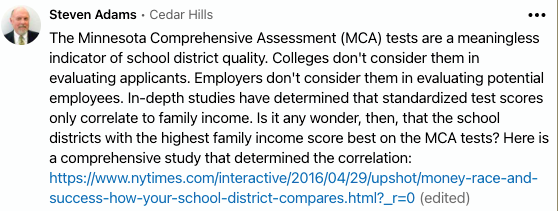Hopkins school board member dismisses state academic tests as ‘meaningless’
Hopkins school board member Steve Adams — who was named to the 2022 All-State School Board, which is the Minnesota School Boards Association’s (MSBA) most prestigious award — recently called the state’s Minnesota Comprehensive Assessment (MCA) tests a “meaningless indicator of school district quality.”
In response to a post on Nextdoor that highlighted the Hopkins district’s five-year trend of academic performance compared to neighboring school districts, Adams wrote:
The Minnesota Comprehensive Assessment (MCA) tests are a meaningless indicator of school district quality. Colleges don’t consider them in evaluating applicants. Employers don’t consider them in evaluating potential employees. In-depth studies have determined that standardized test scores only correlate to family income. Is it any wonder, then, that the school districts with the highest family income score best on the MCA tests?
Adams then linked to a 2016 study published in The New York Times that suggested test scores should not be used to measure performance.

According to Hopkins school district’s MCA test results, over 58 percent of its students cannot do grade-level math and over 48 percent are not reading at grade level. This adds to the decline in math and reading proficiency districtwide that existed pre-COVID.
Adams’ comments dismiss an accountability measure that the Minnesota Department of Education (MDE), state education agencies across the country, and even countries across the globe have utilized for decades to gauge academic proficiency. His words also insinuate that lower-income students cannot learn at the same level as their higher-income peers.
While test scores are not the only indicator of success, they play a key role in evaluating learning because they are objective, standardized measures of how well the education system and schools themselves are doing in meeting the minimum academic expectations laid out in Minnesota’s K-12 academic standards. Student performance on these assessments can also place healthy pressure on schools, helping to identify which schools are struggling to help students learn and grow. According to MDE, “Assessment is a crucial part of creating equitable opportunities for students.” And based on assessment results, we are failing at this.
Adams is correct that colleges and employers obviously aren’t likely to request an applicant’s statewide assessment scores, but they will expect that student to have basic literacy and numeracy skills — skills that Minnesota students have been struggling to demonstrate on both the MCAs and also national tests (the National Assessment of Educational Progress, or NAEP) for years. NAEP is the only objective student learning outcome measure available to compare states’ academic performance, and it also assesses how states are doing in preparing their students (i.e., whether state standards are rigorous enough).
When NAEP results are income adjusted (with controls for free and reduced-price lunch eligibility), Minnesota fourth graders’ 2019 reading scores ranked 28th in the nation. (Test results from 2022 will be released Oct. 24.) But among low-income students in Mississippi — who in 2019 made up 75 percent of the student body compared to Minnesota’s 37 percent — fourth graders’ reading scores ranked 2nd in the nation. And Mississippi Black and Hispanic students outperformed Minnesota’s Black and Hispanic students on both the 2019 math and reading NAEP tests.
Uniform statewide assessments are necessary for accountability. Can educational assessments be improved? I believe so. But they certainly cannot be entirely dismissed, as they remain a key way of holding schools accountable, understanding students’ knowledge and capabilities and measuring achievement in an objective, fair, and valid way.